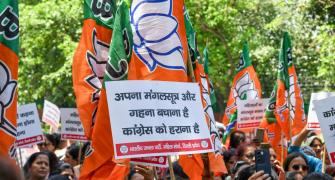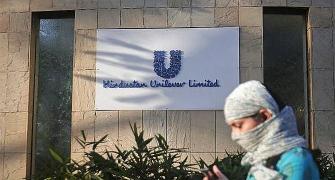One needs to charge the device every four days, which can provide over 65,000 blood readings and counts.

Home-grown start-up BlueSemi is taking a leaf out of Apple's book.
As tech giant Apple gets ready to introduce non-invasive blood glucose monitoring on its eponymous smartwatch, Hyderabad-based BlueSemi is eyeing first-mover advantage in the Indian market -- having developed a healthcare device to measure vitals such as blood glucose levels and blood pressure without a pinprick.
Eyva, BlueSemi's tech device performs ECG (electrocardiogram), measures heart rate, blood pressure and SpO2 (blood oxygen saturation), checks haemoglobin A1c (HbA1c) -- a test that measures the amount of blood sugar (glucose) attached to your haemoglobin -- and body temperature in merely 60 seconds with just a touch without pricking the skin.
Sunil Maddikatla, CEO and co-founder, BlueSemi, pointed out that the firm consciously chose not to make it a wearable device to avoid entering into an already cluttered market.
Eyva, whose name has been inspired from the US movie Avatar, is a device that can have four profiles and can thus cater to an entire family.
Priced at about Rs 16,000, the device does not need any consumables like cartridges, strips, batteries, needles etc. to keep it running. These consumables are usual requirements for instant blood glucose monitoring devices.
Maddikatla says BlueSemi, backed by senior executives of Google, Microsoft, Samsung etc, has invested around $1 million to develop this device, which was showcased at the consumer technology show, CES 2022, in Las Vegas last year.
"We decided to not make a wearable as that is already a cluttered market. Also, because it's a hand-held device, an entire family can use it, making it cost-effective," Maddikatla says.
Typically, an Indian spends about Rs 3,000 a month if it uses a blood glucose monitor.

One needs to charge the device every four days, which can provide over 65,000 blood readings and counts.
"Monitoring the health parameters or vitals regularly can influence people's lifestyles and their choices," Maddikatla says.'
The device is powered by a patented technology that uses sensor fusion, artificial intelligence and Internet Of Things. These haptic sensors respond to a person's touch, even mirroring their breathing patterns.
Post COVID-19, Maddikatla says, people aged 30-45 years want to own at least one body-analysing device.
"If one looks at the wearable devices market, then there are at least 750 million users in India already," he adds.
BlueSemi's facilities in Bengaluru, Delhi and Ahmedabad make the various components of this device, which is finally assembled in Ahmedabad.
The company can make 10,000 units per quarter at present, and is selling only through its Web site.
Maddikatla says the firm is in talks with e-commerce giants such as Amazon and Flipkart and is likely to engage with them from summer.
To scale up manufacturing, the company has already tied up with contract manufacturers in Tamil Nadu and Delhi, who can cumulatively make 100,000 units every six months.
"Next year, we aim to sell 60,000 units in India," Maddikatla says. From 2024, BlueSemi plans to start exports.
As a non-invasive health-tech device, Eyva would compete directly with the smart-wearable devices.
The global wearable technology market was valued at $61.30 billion in 2022 and is expected to expand at a compounded annual growth rate of 14.6 per cent from 2023 to 2030.
The first nine months of the year (January-September) have seen 75 million wearable devices shipped to India, according to International Data Corporation.
Feature Presentation: Ashish Narsale/Rediff.com










